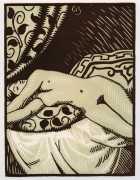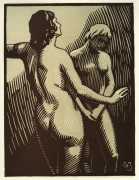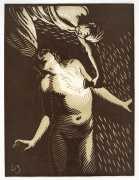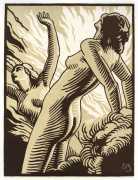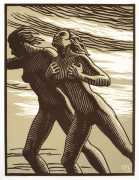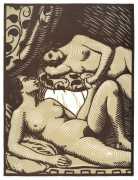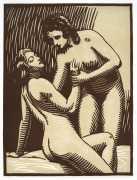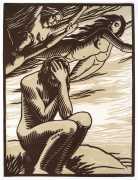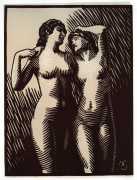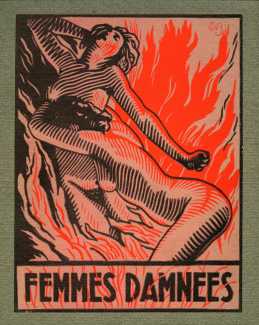 Femmes damnées (Accursed Women) is probably best known of the poems from Charles Baudelaire’s celebrated verse anthology Les fleurs du mal (The Flowers of Evil), and this wonderfully stylish edition masterminded by the upmarket Paris publisher René Kieffer is possibly the best combination of text and imagery ever to have been produced. The only surprising aspect of the collaboration is that Émile Bracquemond was never commissioned to create anything quite as ambitious again; maybe it was the advent of war that prevented a reprise.
Femmes damnées (Accursed Women) is probably best known of the poems from Charles Baudelaire’s celebrated verse anthology Les fleurs du mal (The Flowers of Evil), and this wonderfully stylish edition masterminded by the upmarket Paris publisher René Kieffer is possibly the best combination of text and imagery ever to have been produced. The only surprising aspect of the collaboration is that Émile Bracquemond was never commissioned to create anything quite as ambitious again; maybe it was the advent of war that prevented a reprise.
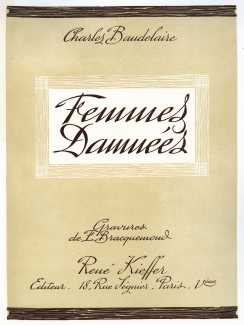 Inside a specially-made case covered in dark grey embossed cloth is a portfolio with a dark brown cover, a black and flaming bright red paper panel set into a blind embossed rectangle. Following a stylish title page, the nine duotone woodcut plates are each set opposite a page of text, typeset in a florid but very legible typeface, in black on a light brown background with a thin rugged border at head and foot.
Inside a specially-made case covered in dark grey embossed cloth is a portfolio with a dark brown cover, a black and flaming bright red paper panel set into a blind embossed rectangle. Following a stylish title page, the nine duotone woodcut plates are each set opposite a page of text, typeset in a florid but very legible typeface, in black on a light brown background with a thin rugged border at head and foot.
Here is the beginning of the text of Baudelaire’s poem, inevitably controversial when it was first published, about the classical lesbian lovers Delphine and Hippolyta.
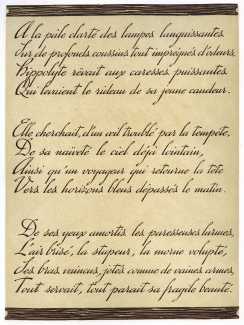 Femmes damnées
Femmes damnées
À la pâle clarté des lampes languissantes,
Sur de profonds coussins tout imprégnés d’odeur
Hippolyte rêvait aux caresses puissantes
Qui levaient le rideau de sa jeune candeur.
Elle cherchait, d’un oeil troublé par la tempête,
De sa naïveté le ciel déjà lointain,
Ainsi qu’un voyageur qui retourne la tête
Vers les horizons bleus dépassés le matin.
De ses yeux amortis les paresseuses larmes,
L’air brisé, la stupeur, la morne volupté,
Ses bras vaincus, jetés comme de vaines armes,
Tout servait, tout parait sa fragile beauté.
Étendue à ses pieds, calme et pleine de joie,
Delphine la couvait avec des yeux ardents,
Comme un animal fort qui surveille une proie,
Après l’avoir d’abord marquée avec les dents.
Beauté forte à genoux devant la beauté frêle,
Superbe, elle humait voluptueusement
Le vin de son triomphe, et s’allongeait vers elle,
Comme pour recueillir un doux remerciement.
Elle cherchait dans l’oeil de sa pâle victime
Le cantique muet que chante le plaisir,
Et cette gratitude infinie et sublime
Qui sort de la paupière ainsi qu'un long soupir.
Hippolyte, cher coeur, que dis-tu de ces choses?
Comprends-tu maintenant qu’il ne faut pas offrir
L’holocauste sacré de tes premières roses
Aux souffles violents qui pourraient les flétrir?
Accursed Women
In the pallid light of languishing lamps,
In deep cushions redolent of perfume,
Hippolyta dreamed of the potent caresses
That drew aside the veil of her young innocence.
She was seeking, with an eye disturbed by the storm,
The already distant skies of her naiveté,
Like a voyager who turns to look back
Toward the blue horizons passed early in the day.
The listless tears from her lacklustrous eyes,
The beaten, bewildered look, the dulled delight,
Her defeated arms thrown wide like futile weapons,
All served, all adorned her fragile beauty.
Lying at her feet, calm and filled with joy,
Delphine gazed at her hungrily, with burning eyes,
Like a strong animal watching a prey
Which it has already marked with its teeth.
The strong beauty kneeling before the frail beauty,
Superb, she savored voluptuously
The wine of her triumph and stretched out toward the girl
As if to reap her reward of sweet thankfulness.
She was seeking in the eyes of her pale victim
The silent canticle that pleasure sings
And that gratitude, sublime and infinite,
Which the eyes give forth like a long drawn sigh.
Hippolyta, sweet, what do you think of our love?
Do you understand now that you need not offer
The sacred burnt-offering of your first roses
To a violent breath which could make them wither?
(translated by William Aggeler)
Femmes damnées was published by René Kieffer, Paris, in a limited numbered edition of 350 copies.


